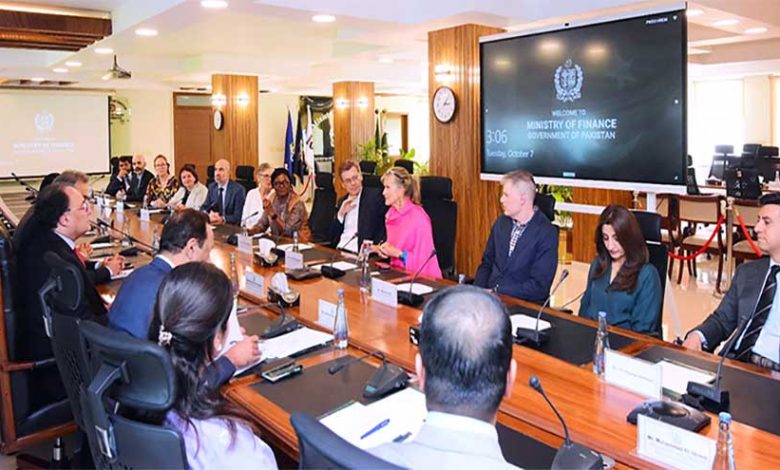The FinMin said that Pakistan wants to get into the USD, Euro, and Islamic Sukuk markets.

On Tuesday, Finance Minister Muhammad Aurangzeb announced that the country aims to enter the US dollar, euro, and Islamic sukuk markets “in due course” as part of its efforts to diversify its sources of finance and keep the economy stable.
The news was made during a meeting with a high-level Acumen delegation led by Jacqueline Novogratz, the company’s founder and CEO. A group of board members and global investors is in Pakistan to meet with government officials and private sector representatives. This is considered as a sign that foreign investors are once again interested in the economy of the South Asian country.
The Finance Division said in a statement following the meeting that “Aurangzeb also talked about Pakistan’s plans to issue its first Panda Bond before the end of the year and its plans to enter the USD, Euro, and Islamic Sukuk markets in the future.”
A Panda Bond is a sort of loan that a foreign borrower issues on China’s domestic market and is measured in renminbi (RMB). It lets foreign governments and businesses get money from Chinese investors and expand their sources of funding.
“The Minister said again that the private sector must lead Pakistan’s economic growth, and the government must create an environment that supports this growth,” the finance ministry said.
“He talked about how Pakistan is moving toward an export-led growth model, which is supported by tariff reforms and responsible fiscal management. The goal is to end the boom-and-bust cycle.”
Aurangzeb was happy that Acumen was still working in Pakistan, especially on agricultural and climate resilience. He also told the group that the backlogs in sending foreign profits and dividends back home were being cleared up. He said that the recent $500 million Eurobond repayment had gone well, which is an indication that the economy is becoming more stable.
Aurangzeb talked about how Pakistan is focusing on structural changes in areas like taxes, energy, and privatization. He mentioned the last stages of Pakistan International Airlines’ sale and the anticipated sale of power distribution businesses.
The minister also stressed Pakistan’s dedication to climate-resilient development, pointing out that the country is dealing with two problems: a growing population and climate change, which has made floods and droughts worse in recent years. He noted that Pakistan’s ten-year Country Partnership Framework with the World Bank, which is a long-term plan that tells the Bank how to help the country with its economic and climate goals, includes policies that support decarbonization, nutrition, and education.
The finance ministry said that Novogratz had said that making it easier for young people in Pakistan to get loans could help turn creative ideas into businesses that can grow. He also said that Acumen was still committed to investing in agriculture, climate resilience, energy, and poverty reduction in the country.
The group also talked about how Acumen’s $90 million Agriculture Resilience Fund for Pakistan is doing. The fund’s goal is to support climate-smart farming and long-lasting food systems.